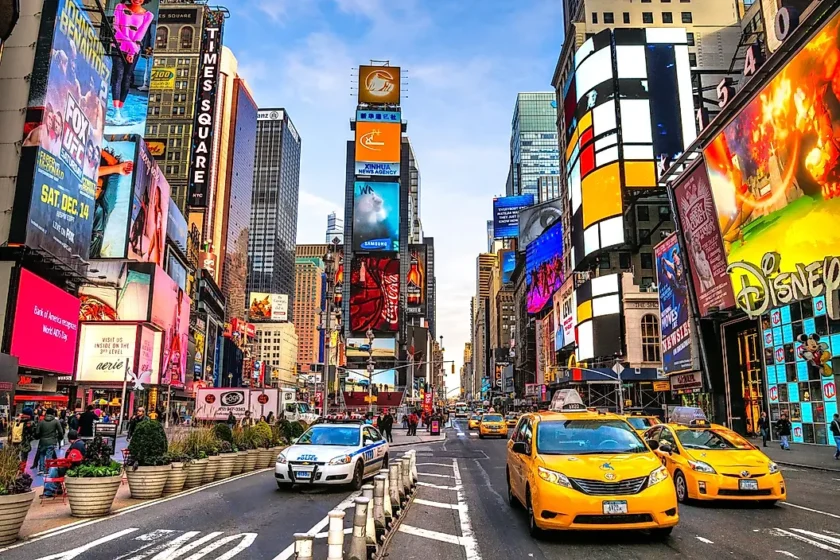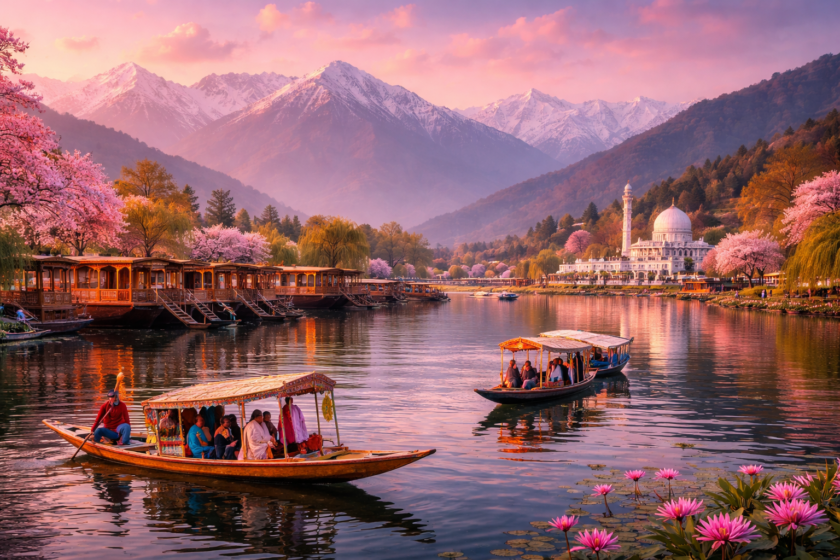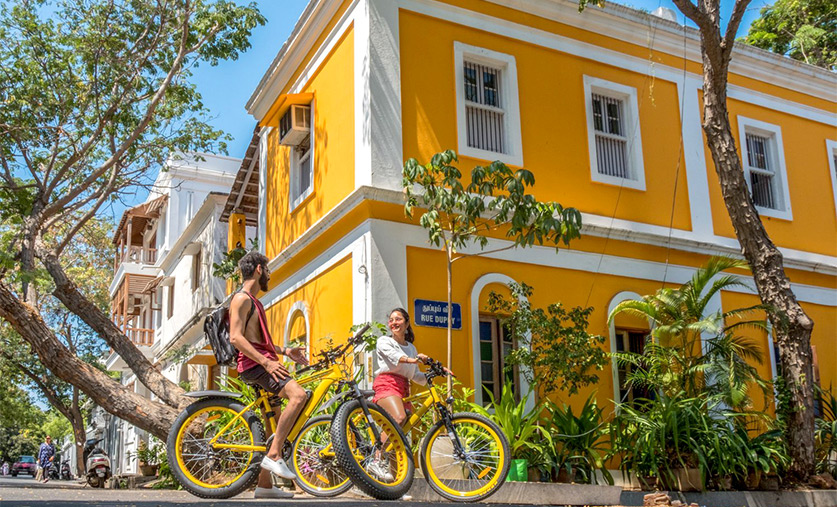Lucknow: Lucknow, the cultural heart of Uttar Pradesh, has always been synonymous with poetic elegance, intricate Chikankari embroidery, and the rich aromas of Awadhi cuisine. For decades, it was celebrated for its nawabi charm—a city where heritage whispered from the arches of Mughal-era buildings and slow afternoons were savored over kebabs and sherbet.
But over the last few years, something unexpected has been brewing in this genteel city: a vibrant startup ecosystem that is pulling in young entrepreneurs, tech dreamers, and investors. And at the center of this entrepreneurial wave lies a surprising frontrunner—the travel and tourism sector.
Harnessing technology, local expertise, and a modern traveler’s sensibilities, travel startups in Lucknow are rewriting the rules of exploration. From organizing luxury spiritual pilgrimages to providing AI-driven travel recommendations, these ventures are pushing boundaries and creating a distinctive mark in India’s vast travel economy.
This feature takes you through the rise of Lucknow’s startup culture, highlights key players in its travel scene, and examines how they are shaping not just the industry, but the city’s economic and cultural identity.
The Rise of Lucknow’s Startup Ecosystem
Lucknow’s emergence as a startup hub isn’t a stroke of luck—it’s the result of deliberate policy support and a growing appetite for innovation. The Uttar Pradesh Startup Policy 2020 set the ambitious goal of fostering 10,000 startups across the state, offering incentives like seed funding, incubator support, and easier compliance norms.
By mid-2024, the city ranked 230th globally among startup ecosystems, hosting 679 tech ventures and witnessing a 35% rise in funding, with the top three startups alone attracting $5.79 million in investment.
Incubators such as the Software Technology Parks of India (STPI) and The Indus Entrepreneurs (TiE) chapter in Lucknow have been instrumental, offering mentorship, networking, and a bridge to capital. For travel entrepreneurs, this has meant access to the resources they need to develop platforms that meet modern travel needs—from seamless booking apps to curated cultural experiences.
The timing is perfect. Globally, the travel industry is worth over $1 trillion and is rapidly embracing technology. In India, changing lifestyles, rising disposable incomes, and post-pandemic wanderlust have created fertile ground for innovation. Lucknow’s startups are tapping into this momentum, offering everything from luxury pilgrimage tours to AI-powered travel planning.
Key Travel Startups in Lucknow
Several players have emerged as flag-bearers of this movement. Here are some of the most notable ventures transforming travel from the City of Nawabs:
1. Comfort My Travel
Founded by Vivek Bishnoi, Comfort My Travel has become a name synonymous with high-end, personalized travel. Specializing in niche offerings like the Kailash Mansarovar Yatra, luxury car rentals, and Volvo bus services, the company blends comfort with cultural richness.
Its Kailash Mansarovar Yatra packages stand out—handling permits, accommodations, and expert guides, allowing pilgrims to focus on the spiritual journey rather than logistics. The company also caters to leisure and corporate travelers, tapping into India’s luxury travel market, which is projected to grow at a 7.8% CAGR through 2030.
With an emphasis on technology, from real-time booking to customer support, Comfort My Travel has carved a loyal customer base both locally and nationally.
2. Bharat Taxi
If Comfort My Travel is about curated luxury, Bharat Taxi focuses on making intercity travel easy, affordable, and reliable. Headquartered in Lucknow, it offers outstation cab services across India with a transparent pricing model and a wide network that ensures availability even in remote corners of the country.
Its mobile app allows real-time ride tracking, instant bookings, and competitive discounts—features that have helped it compete with larger aggregators. Behind the scenes, data analytics optimizes routes and pricing, balancing affordability with profitability.
By serving both individuals and corporate clients, Bharat Taxi demonstrates how a Lucknow startup can scale to a nationwide footprint without losing service quality.
3. TOURITOR
Founded by Ashish Tewari, TOURITOR has addressed a glaring gap in India’s tourism sector: the shortage of reliable, certified tour guides. Through its platform, travelers can book pre-verified, multilingual guides in destinations across the country.
This not only enhances the travel experience but also builds trust—a key factor for international tourists. TOURITOR integrates guide profiles, ratings, and booking tools in a user-friendly format. For Lucknow, the model has an added cultural benefit: it generates employment for local guides and promotes lesser-known heritage sites, aligning with the global shift toward sustainable tourism.
4. Ready2Go
In a crowded travel booking market, Ready2Go stands out with its AI-driven personalization. Aggregating flight and hotel options from multiple providers, it offers recommendations tailored to a traveler’s budget, destination preferences, and timing.

This approach reduces the overwhelming choice fatigue many face while planning trips. With 60% of Indian travelers preferring online booking platforms (Statista 2023), Ready2Go’s combination of intuitive design, competitive pricing, and 24/7 support has found a receptive audience.
5. Wedding Dreams
Though primarily an event management company, Wedding Dreams has tapped into one of the fastest-growing niches in travel—destination weddings. From Rajasthan’s palaces to Goa’s beaches, it offers full-service planning that covers venues, logistics, guest travel, and accommodations.
Destination weddings now account for 15% of India’s wedding market (2024 industry estimates), and Wedding Dreams uses technology to manage the complex coordination involved, ensuring culturally immersive and memorable celebrations.
Innovations Driving Lucknow’s Travel Sector
The success of these startups isn’t just about passion for travel—it’s about innovation. Some key strategies include:
- AI and Data Analytics – Ready2Go and Bharat Taxi use AI to personalize suggestions and optimize costs, while analytics predict demand and streamline operations.
- Mobile-first Approach – With 80% of Indian travelers using smartphones for trip planning (Google 2024), mobile apps with real-time tracking, instant booking, and in-app support have become essential.
- Sustainable Tourism – TOURITOR’s community-empowering model helps local guides and reduces the environmental footprint by promoting offbeat destinations.
- Niche Specialization – Comfort My Travel’s spiritual journeys and Wedding Dreams’ curated weddings show how focusing on a segment can ensure differentiation in a crowded market.
Challenges and Opportunities
Lucknow’s travel startups operate in a competitive and challenging environment. Funding remains a hurdle, as many rely on bootstrapping or angel investors due to limited venture capital activity in tier-2 cities. Infrastructure gaps, like patchy internet in rural destinations, can affect tech-driven services.
There’s also stiff competition from established giants like MakeMyTrip and Yatra, forcing Lucknow startups to rely on unique experiences or niche targeting to stand out.
Yet, the opportunities are massive. India’s travel market is projected to hit $125 billion by 2027, fueled by a growing middle class and increasing leisure travel. Lucknow’s strategic location—close to Agra, Varanasi, and the Himalayan foothills—makes it a natural base for tourism ventures. Coupled with government investments in infrastructure and campaigns like Incredible India, the growth potential is undeniable.
Impact on Lucknow’s Economy and Culture
These travel startups are more than business ventures—they’re cultural ambassadors. By spotlighting Lucknow’s heritage and promoting regional tourism, they create ripple effects in the economy.
Local employment is a major benefit, from drivers and tour guides to artisans and hospitality workers. Startups like TOURITOR directly boost livelihoods for certified guides, while Comfort My Travel’s spiritual tourism creates business for small hotels, transport providers, and craft markets.
Female entrepreneurs are also making their mark. While not a travel startup per se, ISAK Fragrances founder Vidushi Vijayvergiya demonstrates how tourism-linked businesses can thrive by blending heritage products with global marketing.
Importantly, these ventures are reversing the city’s historical brain drain, attracting skilled professionals back from metros, drawn by the promise of building something meaningful in their hometown. Events like the Vision Startups U.P. Pitch Fest 2025 are helping put Lucknow’s talent pool on the radar of national and international investors.
The Road Ahead
With steady government support, deepening digital penetration, and a post-pandemic hunger for authentic experiences, Lucknow’s travel startups are well-positioned for growth. The next frontier will be global partnerships and scalability.
Collaborations with international players, akin to Zomato’s acquisition of TechEagle, could catapult local ventures into global markets. At the same time, a sharper focus on sustainability and cultural preservation will ensure that growth doesn’t erode the very charm that makes Lucknow an attractive travel hub.
From the narrow lanes of Hazratganj to the tech corridors of Gomti Nagar, Lucknow is evolving from the “City of Nawabs” into a City of Startups. Its travel entrepreneurs are not only creating memorable journeys for customers but also redefining what’s possible from a tier-2 city in India.
By merging cutting-edge technology with a deep respect for heritage, companies like Comfort My Travel, Bharat Taxi, TOURITOR, Ready2Go, and Wedding Dreams are showing that innovation knows no geographical bounds.
And as more travelers—domestic and international—discover the seamless experiences crafted here, Lucknow’s reputation will no longer rest solely on its history and cuisine, but also on its pioneering role in the future of travel.









